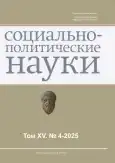Analysis of the main international legal acts and initiatives on AI regulation in modern world political practice
- Authors: Zagaynov M.R.1
-
Affiliations:
- Financial University under the Government of the Russian Federation
- Issue: Vol 15, No 4 (2025)
- Pages: 165-179
- Section: International Relations, Global and Regional Studies
- URL: https://journals.eco-vector.com/2223-0092/article/view/693245
- DOI: https://doi.org/10.33693/2223-0092-2025-15-4-165-179
- EDN: https://elibrary.ru/YMVVWU
- ID: 693245
Cite item
Abstract
The issue of systematization of international laws in the field of use in the world of artificial intelligence (AI) is undoubtedly relevant. The progress of artificial intelligence technologies in international relations determines the need to clarify the legal boundaries of its development and use. The author in this article analyzes the main international legal acts and initiatives to regulate AI in modern world political practice. The purpose of the study is a comprehensive analysis of key international legal acts and initiatives aimed at regulating certain aspects of AI technologies. Based on the hypothesis that, firstly, the fragmentation and predominantly recommendatory nature of international acts on AI reduces the effectiveness of their implementation, and, secondly, that harmonization of approaches and the development of uniform mandatory norms will increase the effectiveness of global regulation of AI, the author conducts a comprehensive analysis of key international legal acts and initiatives aimed at regulating certain aspects of AI technologies. As a result, differences were revealed in legally binding documents (hard law), soft law documents and international standards in the field of AI; their areas of intersection are characterized with a focus on the ethics of using AI as the most cornerstone issue of the AI agenda; proposed recommendations for harmonization of existing standards.
Full Text
About the authors
Mikhail R. Zagaynov
Financial University under the Government of the Russian Federation
Author for correspondence.
Email: ni22nn@mail.ru
ORCID iD: 0000-0002-8913-849X
SPIN-code: 7299-4810
Cand. Sci. (Econ.), head teacher
Russian Federation, MoscowReferences
- Latypova A.F. Artificial intelligence and international law. International Legal Courier. 2023. No. 7. Pp. 63–67. (In Rus.)
- Abbott K.W., Keohane R.O., Moravcsik A. et al. The concept of legalization. International Organization. 2000. Vol. 54. No. 3. Pp. 401–419.
- Allahrakha N. UNESCO’s AI ethics principles: Challenges and opportunities. International Journal of Law and Policy. 2024. No. 2. Рр. 24–36.
- Hutchinson T., Duncan N. Defining and describing what we do: Doctrinal legal research. Deakin Law Review. 2019. Vol. 24. Pp. 83–199.
- Veale M., Borgesius F.Z. Demystifying the draft EU artificial intelligence act. Computers and Society. 2021. No. 4. Vol. 22. Pp. 97–112.
Supplementary files












